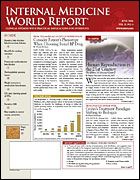Bacteria in the Gut-Too Much of a Good Thing?
From the Mayo Clinic Advances and Controversies in Clinical Nutrition
Link to IBS Suggested
KEY BISCAYNE, Fla?Small intestinal bacterial overgrowth is receiving much attention these days, because it may play a role in the development of irritable bowel syndrome (IBS) symptoms. The overgrowth is generally the result of bacteria that have migrated from the colon into the small intestine. John K. DiBaise, MD, codirector, Gastrointestinal Motility?Center, Mayo Clinic, Scottsdale, Ariz, explained at the 16th Annual Advances and Controversies in Clinical Nutrition seminar of the Mayo Clinic College of Medicine, that migration can occur for a number of reasons.
"Classically, the development of this syndrome relates to previous surgery that alters the gastrointestinal [GI] tract so that the colonic bacteria have easier access to the small intestine or in conditions in which stasis of small bowel contents occurs, such as small bowel strictures, blind loops, or motility disorders," he said.
Dr DiBaise pointed out that assorted bacteria are normally present within the bowel that have beneficial effects on various GI functions, such as epithelial repair, motility, blood flow, and the immune system.
IMWR
The harmful effects of intestinal bacteria may come into play when there is an alteration in the gut flora, such as an increase in either number or specific type(s). In this scenario, malabsorption or maldigestion can occur and result in a variety of symptoms. "Although we tend to think of small bowel bacterial overgrowth as being implicated in ?chronic diarrhea, it can also be responsible for a number of other symptoms, such as gas, bloating, postprandial discomfort, excessive flatulence, weight loss, and, in children, failure to thrive," Dr DiBaise told .
Although the best diagnostic test for small intestinal bacterial overgrowth remains somewhat contentious, the gold standard is the collection of small bowel fluid for colony count to determine if there is an excessive amount of bacteria present.
A less costly, noninvasive diagnostic modality is the hydrogen breath test. "A sugar substrate is ingested, and if there are excessive amounts of bacteria ?present within the small intestine, the bacteria will metabolize the sugar substrate, releasing hydrogen, which is absorbed and passed into the lungs. The expired breath is collected, and the hydrogen measured," Dr DiBaise explained. Despite deficiencies in current diagnostic techniques, he does not recommend empiric treatment of suspected overgrowth.
Treatment should generally be based on correcting the underlying problem. For example, when GI motility is the problem, the first step is administering medications that improve motility.
When stasis occurs within the bowel from mechanical causes, such as small bowel stricture or surgical blind loop, surgical correction may be necessary.
In many cases, however, correction of the underlying problem is not possible, and antibiotic therapy is needed.
If small intestinal bacterial overgrowth is ignored, the symptoms could persist, although they might not worsen. But the condition is not life threatening, and when symptoms are not too bothersome, treatment may be unnecessary.
Dr DiBaise's message for the clinician is to "consider small bowel bacterial overgrowth as a potential cause of chronic diarrhea or gas-related symptoms in patients who may not necessarily be considered high risk." He emphasizes that "small bowel bacterial overgrowth can occur in patients with no previous surgery or obvious motility problems and should be considered in all patients who present with these types of symptoms."
KEY POINTS
Increase in the number or type of small intestinal bacteria can lead to malabsorption or maldigestion.
Bacterial overgrowth can occur in patients with no history of surgery or obvious motility problems.
Symptoms include diarrhea, gas, bloating, postprandial discomfort, excessive flatulence, weight loss, and failure to thrive in children.
The gold standard for diagnosis is analysis of small bowel fluid.
